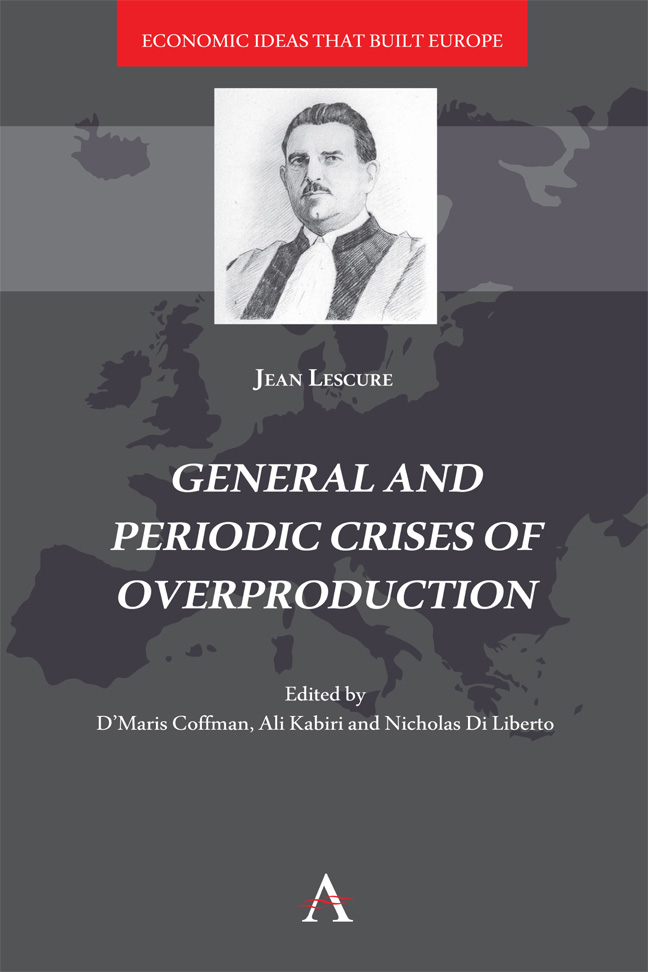70 results
Chapter One - The Phenomenon
-
- Book:
- General and Periodic Crises of Overproduction
- Published by:
- Anthem Press
- Published online:
- 01 March 2024
- Print publication:
- 14 November 2023, pp 63-350
-
- Chapter
- Export citation
Preface to the Fifth Edition
-
- Book:
- General and Periodic Crises of Overproduction
- Published by:
- Anthem Press
- Published online:
- 01 March 2024
- Print publication:
- 14 November 2023, pp 59-60
-
- Chapter
- Export citation
List of Figures
-
- Book:
- General and Periodic Crises of Overproduction
- Published by:
- Anthem Press
- Published online:
- 01 March 2024
- Print publication:
- 14 November 2023, pp 41-42
-
- Chapter
- Export citation
Preface to the Fourth Edition
-
- Book:
- General and Periodic Crises of Overproduction
- Published by:
- Anthem Press
- Published online:
- 01 March 2024
- Print publication:
- 14 November 2023, pp 55-58
-
- Chapter
- Export citation

General and Periodic Crises of Overproduction
-
- Published by:
- Anthem Press
- Published online:
- 01 March 2024
- Print publication:
- 14 November 2023
Volume One - The Phenomenon
-
- Book:
- General and Periodic Crises of Overproduction
- Published by:
- Anthem Press
- Published online:
- 01 March 2024
- Print publication:
- 14 November 2023, pp 61-62
-
- Chapter
- Export citation
Introduction: Jean Lescure on the Role of Solidarité in Industrial Economies and Among the Social Sciences
-
-
- Book:
- General and Periodic Crises of Overproduction
- Published by:
- Anthem Press
- Published online:
- 01 March 2024
- Print publication:
- 14 November 2023, pp 1-30
-
- Chapter
- Export citation
Frontmatter
-
- Book:
- General and Periodic Crises of Overproduction
- Published by:
- Anthem Press
- Published online:
- 01 March 2024
- Print publication:
- 14 November 2023, pp i-iv
-
- Chapter
- Export citation
Contents
-
- Book:
- General and Periodic Crises of Overproduction
- Published by:
- Anthem Press
- Published online:
- 01 March 2024
- Print publication:
- 14 November 2023, pp v-vi
-
- Chapter
- Export citation
Appendix One - Bibliography of the Works Cited by Jean Lescure
-
- Book:
- General and Periodic Crises of Overproduction
- Published by:
- Anthem Press
- Published online:
- 01 March 2024
- Print publication:
- 14 November 2023, pp 499-514
-
- Chapter
- Export citation
Preface to the Third Edition
-
- Book:
- General and Periodic Crises of Overproduction
- Published by:
- Anthem Press
- Published online:
- 01 March 2024
- Print publication:
- 14 November 2023, pp 51-54
-
- Chapter
- Export citation
Appendix Two - Bibliography of the Works of Jean Lescure
-
- Book:
- General and Periodic Crises of Overproduction
- Published by:
- Anthem Press
- Published online:
- 01 March 2024
- Print publication:
- 14 November 2023, pp 515-518
-
- Chapter
- Export citation
Translator's Note
-
- Book:
- General and Periodic Crises of Overproduction
- Published by:
- Anthem Press
- Published online:
- 01 March 2024
- Print publication:
- 14 November 2023, pp 31-34
-
- Chapter
- Export citation
Conclusion
-
- Book:
- General and Periodic Crises of Overproduction
- Published by:
- Anthem Press
- Published online:
- 01 March 2024
- Print publication:
- 14 November 2023, pp 474-488
-
- Chapter
- Export citation
List of Tables
-
- Book:
- General and Periodic Crises of Overproduction
- Published by:
- Anthem Press
- Published online:
- 01 March 2024
- Print publication:
- 14 November 2023, pp 43-50
-
- Chapter
- Export citation
Chapter Two - The Causes of General Overproduction Crises
-
- Book:
- General and Periodic Crises of Overproduction
- Published by:
- Anthem Press
- Published online:
- 01 March 2024
- Print publication:
- 14 November 2023, pp 353-426
-
- Chapter
- Export citation
Index
-
- Book:
- General and Periodic Crises of Overproduction
- Published by:
- Anthem Press
- Published online:
- 01 March 2024
- Print publication:
- 14 November 2023, pp 519-524
-
- Chapter
- Export citation
Acknowledgements
-
- Book:
- General and Periodic Crises of Overproduction
- Published by:
- Anthem Press
- Published online:
- 01 March 2024
- Print publication:
- 14 November 2023, pp vii-viii
-
- Chapter
- Export citation
Chapter Three - Remedies for Crises
-
- Book:
- General and Periodic Crises of Overproduction
- Published by:
- Anthem Press
- Published online:
- 01 March 2024
- Print publication:
- 14 November 2023, pp 427-473
-
- Chapter
- Export citation
General and Periodic Crises of Overproduction
-
- Book:
- General and Periodic Crises of Overproduction
- Published by:
- Anthem Press
- Published online:
- 01 March 2024
- Print publication:
- 14 November 2023, pp 35-40
-
- Chapter
- Export citation



